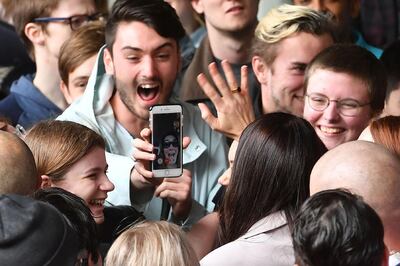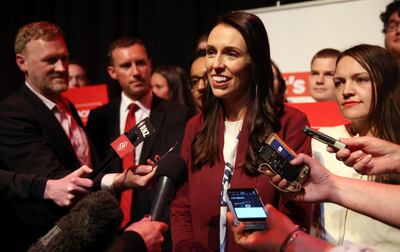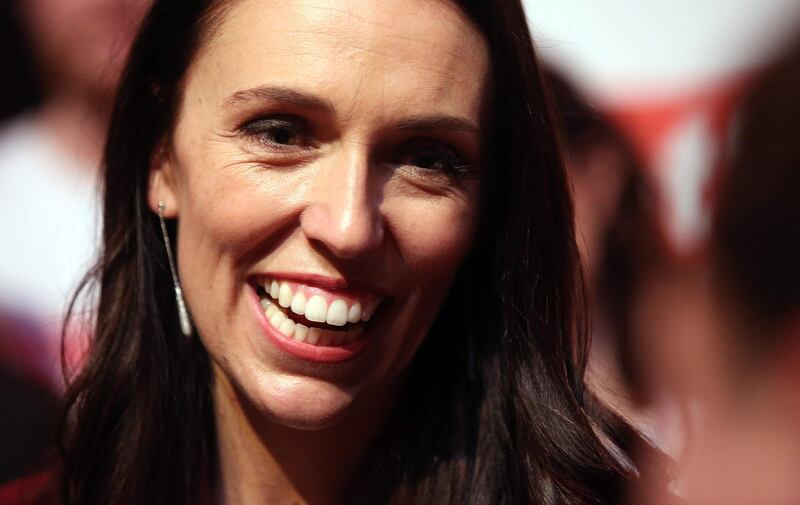A pretty little thing. New Zealand's Justin Trudeau who's more like Trump on immigration. Stardust. Pretty stupid.
The woman at the centre of an Antipodean political frenzy has heard it all.
But one thing Jacinda Ardern, 37, hadn't heard until recently was the idea that she could be New Zealand's next prime minister.
The 4.6-million strong Pacific country has been under the governance of the centre-right National Party since newly-knighted Sir John Key took the reigns from former Labour prime minister Helen Clark in 2008.
National, under the leadership of Bill English after Mr Key's shock resignation late last year, was cruising towards a fairly easy re-election to power — until the main opposition Labour Party drew its wild card.
Seven weeks before the general election, Labour leader Andrew Little fell on his sword after weeks of declining popularity, and Ms Ardern — who had become deputy only five months before — was handed leadership of a party very much in disarray.
Centre-left Labour was lagging well behind in the polls at a dismal 24 per cent, an all-time low. Ms Ardern herself had never been overly ambitious for the leadership, instead choosing to run on a ticket with others as their deputy.
As she accepted the top job, she laughed, acknowledging to gathered media she had just accepted the "worst job in politics".
As it turns out, six weeks can change everything.

Mass hysteria ensued for the Mount Albert MP, who had seen a meteoric rise through the ranks of her party. People queued for hours to hear her speak. Those who didn't fit into overflowing auditoriums stood wistfully outside just to catch a glimpse of her.
Money immediately poured into the Labour campaign: in the 24 hours after Ms Ardern took the job, the party announced it had received 250,000 New Zealand dollars (Dh676,467) in donations — with a peak of $700 being donated every minute in the hours directly after she accepted the leadership. A thousand new volunteers got in touch.
Multiple names have even been coined for the fandom: Jacindaphoria, the Jacinda effect, or Jacindamania.
_______________
Read more:
Australia’s deputy PM ‘may not be eligible for parliament'
Eminem lawsuit against New Zealand political party begins
Surprise, and no surprise, as New Zealand’s popular PM quits
_______________
In Labour's youngest-ever leader, many New Zealanders believe the centre-left has found its saviour.
By all accounts, Ms Ardern's resume is formidable. After picking up a communications degree in New Zealand, the former Mormon went on to work as a staffer for then prime minister Clark while in her 20s, manage a large international NGO, serve as senior policy adviser in then British prime minister Tony Blair's cabinet office and then became president of the International Union of Socialist Youth — only the second woman to do so.
She's also been quick to position herself as the "people's prime minister", promising a campaign relying on "unrelenting positivity", bolstered by her well-known grin.
I cut half my head off (selfie fail) but everyone else looks great! https://t.co/U41pxxuPYx
— Jacinda Ardern (@jacindaardern) August 16, 2017
But some were quick to focus on her other attributes, namely her looks, and her personal life.
In 2015, a morning show panellist called her a "pretty little thing".
In the wake of that scandal, a political commentator labelled her "pretty bloody stupid" for the way she expressed offence to those comments.
The day after she took over as Labour leader, she clashed with a morning show panellist after he asked her about her baby plans.
Most recently, incumbent prime minister Bill English labelled her "stardust". Her reply was swift: "The stardust won't settle".
The Internet's reply was swifter. One pundit produced a tribute to David Bowie, entitled "Jacinda Stardust".
#JacindaStardust #LetsDoThis pic.twitter.com/3IngLbQH9A
— Todd Atticus (@ToddAtticus) September 7, 2017
Then, the international criticism started up.
Australia's foreign minister, Julie Bishop, accused the Labour Party of trying to "undermine the Australian government" when a Labour MP exposed their deputy prime minister as a Kiwi, and questioned whether Canberra could trust a Labour-led New Zealand government.
The Wall Street Journal later tweeted a story on Ms Ardern, saying she was New Zealand's version of Canadian prime minister Justin Trudeau "except she's more like Trump on immigration".
But the public and her TV presenter partner Clarke Gayford have been quick to rally around her.
Even former prime minister Clark, who has just returned home after a stint serving as United Nations Development Programme administrator and a failed attempt to become the first female UN secretary general, has gone in to bat for her.
Meet New Zealand's Justin Trudeau—except she's more like Trump on immigrationhttps://t.co/HXs3FfmrWe
— The Wall Street Journal (@WSJ) September 5, 2017
When it comes to policy, Labour strategy under Ms Ardern seems to be going after voters alienated by the ruling National — and a large dose of populism.
Where the backbone of National's policy is putting more money in the pockets of middle-income New Zealanders, Labour has ruled out tax cuts, instead honing in on big-ticket issues that have been getting a lot of coverage in the domestic media: mental health, inequality, affordable housing and child poverty.
Far from introducing three years of tax cuts as National would, Labour says it will instead introduce taxes on commercial water use, a tourist tax and an Auckland regional fuel tax.
National has responded with announcements on infrastructure and tax cuts.
Both parties have promised cheaper health care for lower-income New Zealanders and major extensions to paid parental leave.
It has been a battle of new school politics versus old school politics and increasingly it seemed as though the millennials would win it for Ms Ardern.
By the end of last month, Labour had overtaken National in the polls for the first time in a decade.

All at once, a nation stood up and took notice and a fairly run-of-the-mill election became interesting.
Now, with three days to go, a late resurgence from National voters has seen them regain a narrow lead. By all accounts, the election is anyone's game.
The resurgence came as the Opportunities Party leader Gareth Morgan — also known as the man who called for the eradication of domestic cats — told The New Zealand Herald his reaction to Labour's surge in the polls was to think voters "cannot be this thick".
Ms Ardern has yet to respond. But then again, she's heard it all before.





